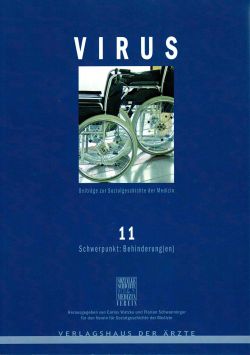
VIRUS Band 11, pp. 053-074, 2020/07/23
Schwerpunkt: Behinderung(en)

This study deals with mentally disabled persons, their perspectives of life and how ruralcommunities treated them in the second half of the 18th century. For that purposeseveral records, especially supplications for admission to Haina, one of the HessianHigh Hospitals, were analysed.The first problem to solve was to find out how mental deficiency was defined in the18th century and to select mentally disabled persons from a variety of persons withsimilar diagnosis and descriptions. At least 32 cases could be identified out of 91requests for reception.The documents show rather complex situations. These children and adults wereactually seen as ill people and in several cases medical help was requested. Furthermore,parents tried to get their disabled children instructed in fundamental skills aswell as in Christian morality, which was required to be integrated into the ChristianCommunity. Although these ambitions were more or less successful, mentally disabledpersons were not excluded from the community. They moved freely and the villagerskept an eye on them to prevent accidents and harms; being unable to work they lookedfor support by begging. Obviously there was a broad range of tolerance, which allowedtheir integration with common agreement.There were typical times when relatives asked for admission of mentally ill persons tothe hospital that depended on the dynamic process of change of lifetime. Whenchildren grew up and gained physical strength, their parents grew older, lost theirstrength and the capability to care for their grown-up children and to keep them withinthe given range of tolerance. The social networks mentally disabled persons dependedon became fragile and more ineffective, and in many cases this change marked the timeto look for future maintenance and supply.
Keywords: 18th century, Hessian High Hospitals, mentally disabled persons, rural society, coping, source-based analysis